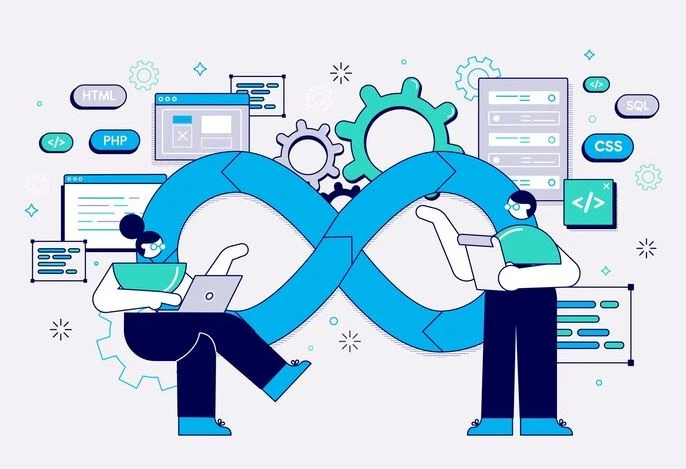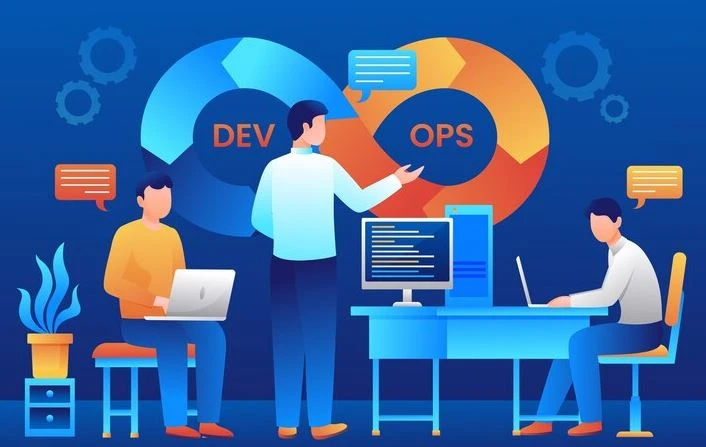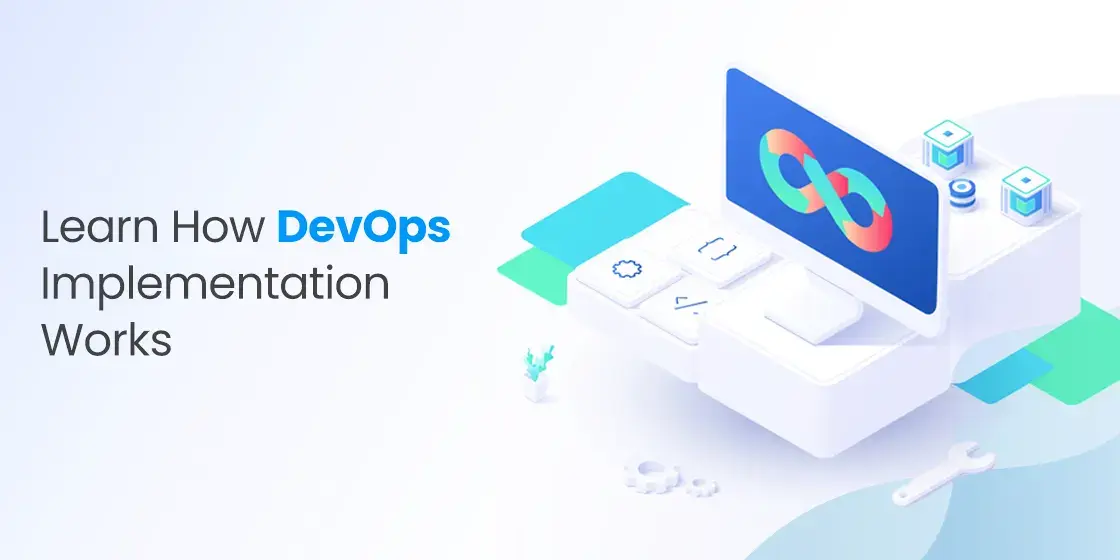Table of Content
Know About the Correct Steps of DevOps Implementation
The adoption of DevOps has recently picked up momentum, as more and more companies are incorporating this process into their work environment. They understand the core importance of DevOps operations, as how it allows IT processes to become streamlined and rapid. The implementation of a DevOps department is however a difficult job. Many people often remain confused how the DevOps implementation plan should be created and proceeded. This usually happens because of little technical knowledge, which is indeed required to work with DevOps operations.
Many people even do not know the exact definition of a DevOps implementation plan. This confusion is found commonly in the industry, which is why most organizations struggle to adapt it initially. One thing should be noted that DevOps implementation or adoption does not happen overnight. It’s a complete process in which various stages are involved, and as a professional, you need to know all these phases. If you will try to work with incomplete knowledge, then you can get caught in between the deployment confusion. As a result, you will not only waste your efforts, but also plenty of precious time as well.
A lot of IT engineers who are new to this concept, often face difficulties at the start of DevOps implementation. This blog is therefore precisely written for them, so that they can understand all the things related to its core deployment. It will let them know how the implementation process works, and what type of essentials are required for it. This information will help them to become a better DevOps professional having all the expertise to manage and complete all types of deployment as per the given requirements.
But, before moving straight into the DevOps implementation plan, let us first understand the rising importance of this field. Let’s take a look why companies are eagerly preferring to adapt DevOps infrastructure to move ahead in the digital world.
What is DevOps?

The word DevOps comes from the combination of two separate words i.e. development and operations. Earlier, both of them were looked as a separate processes, in fact, many companies still treat them keeping solid distinction. However, in 2009, Patrick Debois came up with the idea of integrating both of them. He emphasized on building a unified plan to manage development and other IT processes simultaneously. That is where the term of DevOps was coined, defining how software development services and other IT processes can run side by side.
In other words, DevOps implementation is not a specific methodology, practice, or standard that can be applied uniformly across IT organizations. Rather, it is a manifestation of the IT culture evolution that aims to deliver IT services faster by embracing agile and flexible principles of software development. DevOps implementations rely on technology, especially automation tools that can leverage a dynamic infrastructure that is vastly programmable throughout the development life cycle.
Understanding the Rising Importance of DevOps

We all know the fact that the IT industry is booming with the emergence of new age technologies. Among the notable names, DevOps implementation is a clear standout process that has allowed IT companies to function with more organized efficacy. It is not a conventional process that just takes care of normal IT operations, instead, DevOps refers to the blend of software development and information technology operations that allow companies to manage and control all the tech jobs efficiently.
With the help of DevOps implementation plan, companies can shorten the SDLC process and speed up the delivery of products as suggested by the client requirements. This is what makes DevOps a very unique process for tech companies. They rely on it to streamline the nearshore development operations without disrupting the core supply of IT services. In conventional strategies, both of these things are looked as separate processes, but DevOps has the tendency to manage both without sacrificing anything on the quality.
The good thing about DevOps is that its applications are not just limited to the IT companies, in fact, it could be incorporated with other businesses that are not related to the tech at all. This means that companies other than software houses or data centers can use incorporate DevOps easily into their processes. They just need a proper understanding of this model, and rest could be managed effectively by the process itself.
DevOps Implementation Plan: Right Steps to Follow

A lot times, people do not know what type of steps they should take to implement or build a DevOps process professionally. It is one of those operations that needs a proper implementation plan, which is why you need to prepare for it smartly.
For all the beginners who do not know what DevOps is and how it should be implemented within the IT department, take a look at the points defined below. It will clear all your concepts, giving you a cohesive view how the DevOps implementation plan really works.
Introduce the Idea of DevOps
As they say good things start with a vision, the case for the implementation of DevOps somehow looks to be the same. As a company owner or IT director, it is your responsibility to first introduce the idea of building a DevOps team. At first, people will ask different types of questions, so prepare yourself to answer them by describing the right facts. You can let them know about the benefits of DevOps implementation, as how it can streamline all the IT related operations effectively.
In other words, the introduction of the DevOps initiative relies heavily on the crucial role played by the IT director within the company. DevOps, an integral component of the enterprise’s IT operations, not only influences development and operations but also extends its impact to various business functions like human resources and investment.
Consequently, the IT director holds the authority to modify development processes and operational procedures. Following this, the program manager is responsible for crafting customized DevOps strategies aligned with the business goals and oversees their successful implementation.
Partner with our software development specialists to pioneer custom solutions that drive your business forward.
Request Your Solution
Build a Strong Deployment Strategy
Next up, you need to develop a strategy in which team leads will be given the objective to stack up their teams and educate them about the implementation of DevOps. In this regard, program managers are tasked with harmonizing teams within a collaborative setting by establishing a unified objective. This approach instills a sense of duty and responsibility in each team member. They not only get to know about the DevOps process, but how their duties will be stacked in it.
Essential components of DevOps plan include best practices that introduce innovative approaches to mobile app development, infrastructure, and testing, ultimately enhancing team collaboration. Your strategy should prioritize two key objectives: facilitating the continuous release of production-ready processes and optimizing the work of the rest of the team to the best of their abilities. By fulfilling these two objectives, you can build a strong base of DevOps implementation within the IT department.
Move Towards Application Containerization
Once everyone in the IT department come on the same page, you need to propagate the idea of application containerization next. The swiftly advancing technology of application containerization is transforming the manner in which developers test and deploy application instances in the cloud. Containerizing your applications ensures swift execution without offering any downtime or disruption at all. This process will however require a good technical understanding, so try to pick the right resources first that can work smartly on application containerization.
The packaging of containers enhances the software’s reliability during various operations. Moreover, the segmented nature of containerized programs renders them independent of the overarching infrastructure, enabling them to operate seamlessly in diverse environments without dependencies. Additionally, containerization empowers DevOps teams to efficiently manage applications and implement necessary changes for specific micro-services.
Make Proper Use of QA Testing
Expanding the automation of tests within your development and testing processes can yield significant benefits, including accelerated delivery cycles, enhanced software quality, and broader test coverage. It’s essential to recognize, however, that not every type of test needs to be automated. Before embarking on the automation journey for a particular test, it’s prudent to conduct a careful analysis of the number of iterations that the test requires. This step ensures a judicious investment of effort, helping you determine whether the benefits of test automation justify the resources and time invested.
Furthermore, establishing a robust alignment between QA and Dev teams is paramount. This collaborative alignment serves as a proactive strategy for the early identification of errors. By fostering effective communication and collaboration between QA and Dev teams, you create an environment conducive to swift issue resolution, reducing the likelihood of critical problems persisting into production and enhancing the overall software development and release process.
Build a Strong Infrastructure with CI/CD Tools
Containerizing applications demands a proactive and well-managed approach throughout the software development and deployment lifecycle. The utilization of infrastructure automation tools, coupled with continuous integration/continuous deployment (CI/CD) tools like Jenkins, GoCD, or Bamboo, plays a pivotal role in addressing the intricate aspects of configuration management and deployment within containerized environments. This process certainly requires a greater level of technical expertise, so make sure to work on it with proper information.
Kubernetes, as a powerful container orchestration tool, facilitates the efficient management, scaling, and deployment of containerized applications. Ansible and Chef, recognized for their configuration management capabilities, ensure consistent and reliable configurations across diverse containerized environments. Integrating these tools with CI/CD platforms such as Jenkins, GoCD, or Bamboo streamlines the entire process, allowing for seamless automation of the pipeline—from code integration to deployment.
Core Benefits of DevOps Implementation

DevOps helps businesses to excel in the new age of tech automation. It offers countless benefits in which some are directly related to the advancement of IT teams. If you do not know much about them, take a look at the key benefits of DevOps implementation plan defined below.
Allows IT Teams to React Faster
It is always said that IT teams should troubleshoot and manage every task quickly. This attribute is associated with them because quick responses are required to manage different types of calls effectively. However, achieving this feat often becomes difficult when resources are short and tasks are piling up without any disruption.
This type of situation can be handled by a having a proactive DevOps plan in place. This team will be responsible to manage all the tasks assigned to them dynamically. They will utilize key processes of agile to initiate and manage different tasks, precisely as per the objectives of DevOps.
Offer Data-Driven Results
If you want to get positive results that can amplify your growth in the industry, try to always use data-driven approach. This practice is recommended to all businesses who love to play with numbers and take decisions according to them. In DevOps process, this is the exact case that is followed by the IT engineers. They utilize data to plan every step, so that results can be obtained justifying the need of timely task allocation and calculation.
Using data-driven approach, the development teams can accelerate the pace of different critical projects such as quantum app development. The data lets them know which type of steps should be taken and how much time will be required to complete one project. These are the core perks of DevOps that makes its applications important for any IT team.
Provide Scalability and Flexibility
DevOps is a set of practices that combines software development and IT operations. It aims to shorten the software development life cycle and provide continuous delivery with high software quality. DevOps plan can provide scalability and flexibility by enabling faster and more frequent deployments, automating and streamlining workflows, and fostering collaboration and feedback among different teams.
DevOps implementation can also help organizations adapt to changing customer needs, market trends, and business goals. All of these traits help companies to shape their functionalities rightly as per the demands of the market. It gives their processes flexibility to adapt different requirements, and provide solutions according to them.
Frequently Asked Questions
| What is DevOps implementation plan? A DevOps implementation plan outlines the structured approach to integrating development and operations teams to streamline software delivery. It includes goals, and timelines for automating workflows, and improving deployment efficiency. |
| Why IT companies are adopting DevOps processes? IT companies are adopting DevOps to accelerate software delivery, improve product quality, and respond faster to market changes. It enhances collaboration, automates processes, and reduces deployment failures. |
| What are the benefits of DevOps implementation? DevOps implementation leads to faster software releases, improved collaboration, and higher system reliability. It also enhances scalability, reduces downtime, and promotes continuous improvement. |
More Insightful Articles:
Final Words
That takes us to the end of this blog in which we have discussed about DevOps implementation in detail. It is an important topic that should be understood properly. Many people still do not know how DevOps implementation plan works, and what is the core utility of this process. This blog is therefore written to help them out in clearing the concepts related to DevOps implementation. It has described the complete pathway of DevOps implementation, defining how the process can be initiated and complete by following some key rules.
Meanwhile, if you are looking for a company that can offer you dedicated DevOps team to build and manage different projects, get in touch with us today. Our teams are well experienced in different areas of DevOps implementation, and you can always count on us to get quality services as per the needed requirements.

Empower your digital journey with StruqtIO - Your dedicated partner for cutting-edge custom software development, innovation, and digital transformative solutions. Harness the power of technology to elevate your business and redefine your digital landscape today.


